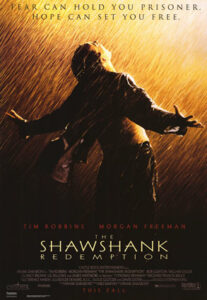Dear All
Below is the link to today’s service. We had a joyful gathering this morning with Penny on the piano, the congregation were in full voice, despite missing some of our stronger singers!
This week we have Vestry tomorrow and the book group on Wednesday as well as our regular services of prayer group on Tuesday and Holy communion on Thursday.
Once again a big thank you to Penny and Geoff for organising such an enjoyable concert on Wednesday – it was wonderful to see the church full again for a social occasion. Thank you, Robert, for covering front of house so smoothly.
Trinity 12 2021 St Andrew’s Milngavie
 Ephesians 6:10-20
Ephesians 6:10-20
Joshua 24:1-2,14-18
John 6:56-69
Some of you may have seen the film The Shawshank Redemption. Set in an American prison it deals with themes of redemption, perseverance in the face of adversity, hope and freedom.
At one point in it the character Red describes what it means to be institutionalised. ” These walls are funny “, he says “first you hate them, then you get used to them, And then you depend on them; That’s institutionalised” When Red is finally released, he finds, as he feared, that freedom is unnerving and cruel. His mind is so shaped by the years of imprisonment that it is difficult for him to act as a free man. He even considers reoffending in order to get back to the relative security of institutional life. Red finds that even when his body is free his mind is telling him that he is still in prison.
Freedom, redemption and hope are at the heart of Christ’s message. And in a sense, it is no less tricky for us to understand what it is to be free than it was for Red in the Shawshank Redemption. There are many things that oppress and imprison us. We are rarely free to simply please ourselves, our lives are shaped by the boundaries of a legalised society, by our health, our relationships and indeed our personalities.
Over the last 18 months we have all known what it is like to live a life of significant restriction. The two lockdowns have left their mark on many of us. And like Red many people have confessed to wishing the lockdown could have continued, not necessarily for reasons of disease control, but simply because that had become the new status quo and therefore familiar, comforting almost as it removed certain pressures from life. But perhaps the thing that represents our captivity most is our need for food and drink. We can never be free from the fact that before we do anything else, we need to make sure we and those around us have enough to eat. So, when Jesus announces himself to be the bread of life, He strikes right at the heart of that which hold us captive
as human beings. He declares that the bottom line of our existence is not our need for food and drink, but our need for Christ.
This was a daring statement to make and not surprisingly it was followed by cries of protest. Who was this local boy, after all, to say such outrageous things? In the verses following our reading we learn that even those who had supported him had started to drift away. But John crafts his gospel to help his readers to see who Jesus really is and to put their faith in him.
But it is not easy. It wasn’t easy for the people of Jesus’ time And it’s not easy for us. Through faith in Christ, we have unimaginable gifts: the gift of love; the gift of forgiveness and the gift of hope. But they are not always easy gifts to receive, and we are still captive to our human needs and circumstances; they still shape how we think and act.
So, what kind of freedom is it that we have through Christ? Is it spiritual freedom that exists despite our physical and mental constraints? Or is it freedom that comes into effect only when we are finally free of our earthly bodies after we die? It is both these things and yet more.
When Jesus declares himself to be the bread of life, he is effectively saying that his spirit operates at the heart of our everyday lives, at the heart of what it means to be human. It is a spirit, an energy even, that nurtures and feeds our soul, and changes how we live in the here and now. And not just one that exists only on a spiritual level or only in the hereafter.
As Christians we know what it is to struggle with the contradiction of our human constraints and our spiritual freedom. It may be that we are amply provided with food and drink, but we all know what it is to pay bills on time, please those around us, complete tasks and care for our family and friends.
As Red found in the Shawshank Redemption, and we more recently on our lockdowns, years of captivity shape your mind. The trick is not just to live differently bit to think differently,
and for Christians the means to achieve this is to feed on the bread of life. Let’s pray that we find the courage to feed on Christ and in doing so be truly free even in the humdrum constraints of our everyday life.
